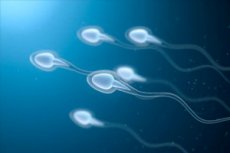New publications
Father's gut microbiota influences the next generation
Last reviewed: 02.07.2025

All iLive content is medically reviewed or fact checked to ensure as much factual accuracy as possible.
We have strict sourcing guidelines and only link to reputable media sites, academic research institutions and, whenever possible, medically peer reviewed studies. Note that the numbers in parentheses ([1], [2], etc.) are clickable links to these studies.
If you feel that any of our content is inaccurate, out-of-date, or otherwise questionable, please select it and press Ctrl + Enter.

A study by Hackett's group at the European Molecular Biology Laboratory (EMBL) in Rome found that disrupting the gut microbiome in male mice increases the risk of disease in their future offspring.
The gut microbiome is the microbial community that inhabits the gastrointestinal tract. It is responsible for producing enzymes, metabolites, and other molecules important to the host's metabolism and response to the environment.
A balanced gut microbiome is therefore important for mammalian health, helping to regulate the immune and endocrine systems. This, in turn, influences the physiology of tissues throughout the body. However, little was known about the influence of the gut microbiome on host reproductive function and whether an altered paternal microbiome could affect the health of his offspring.
Hackett’s group at EMBL in Rome, together with the groups of Bork and Zimmermann at EMBL in Heidelberg, set out to answer this question. Their results, published in the journal Nature, showed that disrupting the gut microbiome in male mice increases the likelihood that their offspring will be born with low birth weight and will be at increased risk of premature death.
Passing on information to the next generation
To study the impact of the gut microbiome on male reproduction and their offspring, the researchers altered the composition of microbes in the guts of male mice by treating them with common antibiotics that do not enter the bloodstream. This causes a condition called dysbiosis, in which the microbial ecosystem in the gut becomes unbalanced.
The scientists then analyzed changes in the composition of important testicular metabolites. They found that dysbiosis in male mice affected testicular physiology, as well as metabolite composition and hormonal signaling. At least part of this effect was due to changes in levels of the key hormone leptin in the blood and testes of males with induced dysbiosis.
These observations suggest that mammals have a "gut-germline axis" that is an important link between the gut, its microbiota, and the germline.
To understand the importance of this “gut-germline axis” for heritability, the scientists bred either untreated or dysbiotic males to untreated females. The pups of dysbiotic fathers had significantly lower birth weights and increased mortality after birth. Different combinations of antibiotics, as well as treatment with dysbiosis-inducing laxatives (which also disrupt the microbiota), had similar effects on the offspring.
Importantly, this effect is reversible. Once the antibiotics are stopped, the fathers' microbiomes are restored. When mice with restored microbiomes are mated with untreated females, their offspring are born at normal weight and develop normally.
"We observed that the intergenerational effects disappeared after the normal microbiome was restored. This means that any change in the gut microbiome that could cause intergenerational effects can be prevented in future fathers," said Peer Bork, director of EMBL Heidelberg, who was involved in the study.
"The next step is to understand in detail how various environmental factors, such as drugs including antibiotics, can influence paternal germlines and hence embryonic development."
Aile Denboba, first author of the paper and a former postdoctoral fellow in Hackett's group, now a group leader at the Max Planck Institute for Immunology and Epigenetics in Freiburg, Germany, added: "The study arose from a desire to understand the influence of the environment on fathers by considering the gut microbiome as a bridge between host-environment interactions, creating a sufficient cause model for assessing intergenerational health risks in complex ecological systems."
The influence of fathers on the risk of diseases during pregnancy
In their work, Hackett and colleagues also found that placental defects, including poor vascularization and slow growth, were more common in pregnancies involving dysbiotic males. The defective placentas showed signs of a common pregnancy complication in humans called preeclampsia, which leads to poor growth in offspring and is a risk factor for a wide range of diseases later in life.
"Our study demonstrates the existence of a communication channel between the gut microbiome and the reproductive system in mammals. Moreover, environmental factors that disrupt these signals in expectant fathers increase the risk of adverse offspring health by altering placental development," said Jamie Hackett, coordinator of the research project and leader of the EMBL Rome group.
"This implies that in mice, the paternal environment immediately before conception can influence offspring traits independently of genetic inheritance."
"At the same time, we found that this effect only occurs in one generation, and I must emphasize that more research is needed to examine how widespread these effects are and whether they are relevant to humans. There are inherent differences that need to be taken into account when translating mouse findings to humans."
Hackett continued: "But given the widespread use of dietary and antibiotic practices in Western culture that are known to disrupt the gut microbiome, it is important to look more closely at the intergenerational effects of fathers and how they may influence pregnancy outcomes and disease risk in the population."
